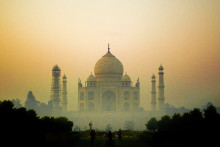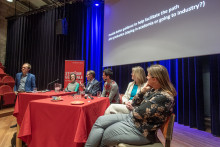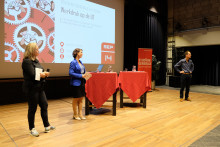At the start of the evening, Stoelinga first answers the question ‘what makes India so relevant in the current time?’. He highlights three reasons why we should keep an eye on India. First: ‘The world order which we had from the end of the Cold War is coming to an end, meaning an end to the hegemony of the United States and more room for other countries on the world podium, including India’. Second, he points at India itself, noting: ‘It stands on a turning point: according to predictions, it will soon be the largest country in the world with 1.5 billion inhabitants and it will soon be the third largest economy’. Third and last, he highlights: ‘India is part of the ‘free world’: it is a democracy with a free press and independent justice, which is not the case with the other superpower in the region, China’.
In continuing his lecture about India and its relationship with the West, he makes a number of interesting statements. One of these is a comparison between India and China: ‘India will not become a second China, because its main export product is not the manufacturing industry, but knowledge. Also, India has a very young, high-educated and well-connected population, which has a good knowledge of English. So, India is more a knowledge country than a manufacturer for the rest of the world.’
Lastly, he highlights the key point of his book, ‘India: land van de toekomst (land of the future)’, which is that India is an invisible country for the West and vice versa. Here, he says: ‘Europe is invisible for India because Indians do generally not like the European Union: they see it as a sort of United Nations, which acts from a moral high ground and points with its finger. India is invisible for Europe because Europe is too busy with its own struggles (Brexit for example) and Europe is mainly worried with its direct environment, which does not contain India.’







